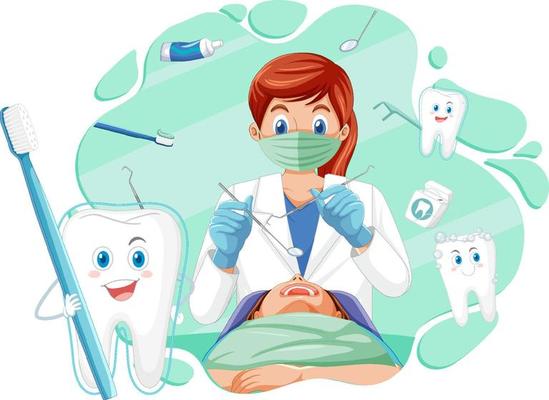The Benefits of Regular Visits to a Dentist Eugene Oregon
The Benefits of Regular Visits to a Dentist Eugene Oregon
Blog Article
An Overview to Usual Oral Conditions That Call for a Dental practitioner's Treatment
Comprehending the series of oral problems that necessitate expert care is critical for maintaining optimum oral health and wellness. Toothaches, for instance, can be symptomatic of extreme issues such as tooth cavities, split teeth, or abscesses, each calling for particular treatments like dental fillings or root canals. Gum illness, from the beginning of gingivitis to more extreme periodontitis, highlights the value of normal dental examinations and cleansings. Influenced knowledge teeth and jaw problems can introduce substantial discomfort and difficulties. Making sure prompt visits to the dental professional can mitigate these problems effectively, but exactly what are the therapies and signs involved?
Toothaches
Toothaches are an usual oral problem that can vary from mild discomfort to extreme pain, commonly showing a hidden problem that requires professional focus. This discomfort can originate from a variety of resources, consisting of dental tooth cavities, cracked or fractured teeth, and dental abscesses. Each of these problems positions substantial threats if left neglected, possibly bring about much more severe difficulties.
Oral cavities, additionally understood as decays, are triggered by the build-up of plaque that deteriorates tooth enamel, leading to holes or pits in the affected teeth. Abscesses are excruciating infections at the origin of a tooth or between a tooth and the gum tissue, usually resulting from serious degeneration or without treatment dental caries.
Reliable treatment of toothaches involves attending to the origin. This may include fillings for cavities, crowns for split teeth, or root canals and antibiotics for abscesses. Early treatment by an oral expert can protect against more deterioration and ease pain, making sure optimum oral health.
Periodontal Illness

The primary root cause of gum tissue disease is microbial plaque, a sticky, colorless film that frequently forms on teeth. Poor oral health, smoking cigarettes, genetic proneness, and certain medical problems, such as diabetes, can exacerbate the threat of creating periodontal condition. Routine oral check-ups are important for very early discovery and monitoring of this condition.
Therapy for gum condition varies from expert dental cleansing and scaling to more advanced procedures like root planing and periodontal surgery, depending on the severity. Keeping good oral hygiene practices, including cleaning twice daily, flossing, and using a disinfectant mouth wash, can dramatically lower the risk of gum disease and advertise healthier periodontals.
Tooth Cavities
Tooth cavities, additionally referred to as tooth decays, are a typical oral problem defined by the destruction of tooth enamel due to acid-producing microorganisms in the mouth. These bacteria grow on sugars and starches from food my website and drinks, generating acids that progressively erode the enamel, bring about tooth cavity formation.
Early-stage dental caries may not show symptoms, but as they progress, they can trigger toothache, sensitivity to hot or chilly, visible holes or pits in the teeth, and staining. If left unattended, cavities can permeate deeper layers of the tooth, possibly resulting in extreme discomfort, infection, and even tooth loss.
Avoiding tooth cavities includes a combination of good oral health practices and dietary habits. Routine cleaning with fluoride tooth paste, flossing, and routine dental useful source check-ups are vital. Dental experts might additionally recommend added safety nets, such as fluoride treatments and dental sealants, to secure teeth from decay.
Small tooth cavities can be attended to with dental fillings, which restore the tooth's structure. More innovative situations may call for crowns or even origin canal treatment if the degeneration has actually gotten to the tooth's pulp.
Impacted Knowledge Teeth
Influenced wisdom teeth are a widespread oral issue that takes place when the 3rd molars, commonly referred to as wisdom teeth, stop working to fully emerge or align effectively within the mouth. This condition frequently results from inadequate room in the jaw or an irregular development angle of the teeth. Influenced knowledge teeth can lead to a variety of problems, including damage, discomfort, and infection to adjacent teeth.
When knowledge teeth become influenced, they are commonly partly erupted or remain entirely under the gum tissue line. This partial eruption can produce a path for bacteria to enter the gums, bring about infections that manifest as swelling, discomfort, and also fever (dentist in eugene oregon). In addition, impacted knowledge teeth can apply stress on surrounding teeth, potentially triggering crowding or moving
A thorough oral exam, typically involving X-rays, is essential for identifying affected wisdom teeth. Normal dental check-ups are recommended to keep track this article of the condition and preserve dental health.
Jaw Disorders
Verdict

Dental tooth cavities, also understood as decays, are caused by the accumulation of plaque that deteriorates tooth enamel, leading to holes or pits in the influenced teeth. Abscesses are excruciating infections at the origin of a tooth or between the periodontal and a tooth, usually resulting from extreme decay or without treatment tooth cavities.
Impacted knowledge teeth are a widespread oral problem that takes place when the third molars, generally referred to as knowledge teeth, stop working to fully emerge or align correctly within the mouth. Impacted knowledge teeth can lead to a selection of difficulties, including damage, pain, and infection to surrounding teeth.
Furthermore, influenced wisdom teeth can apply stress on neighboring teeth, possibly creating crowding or changing.
Report this page